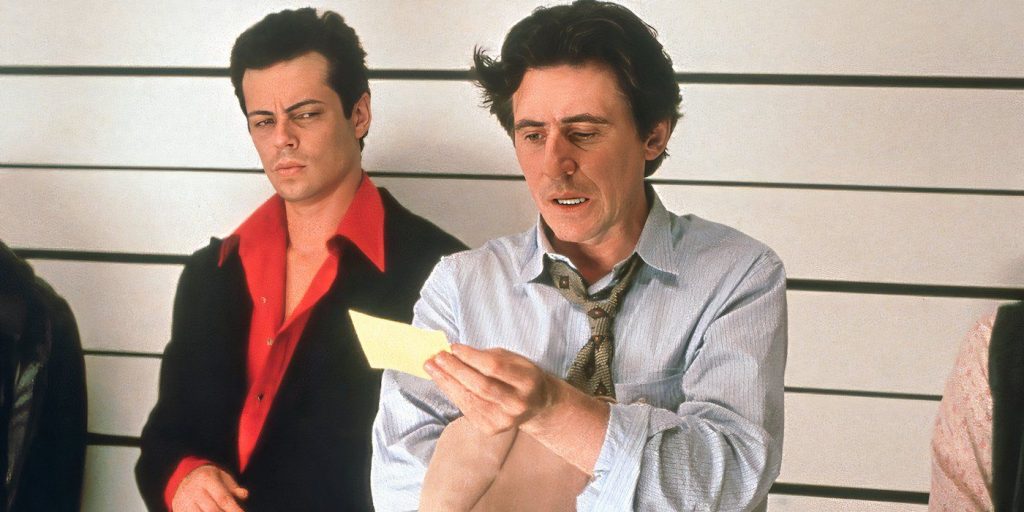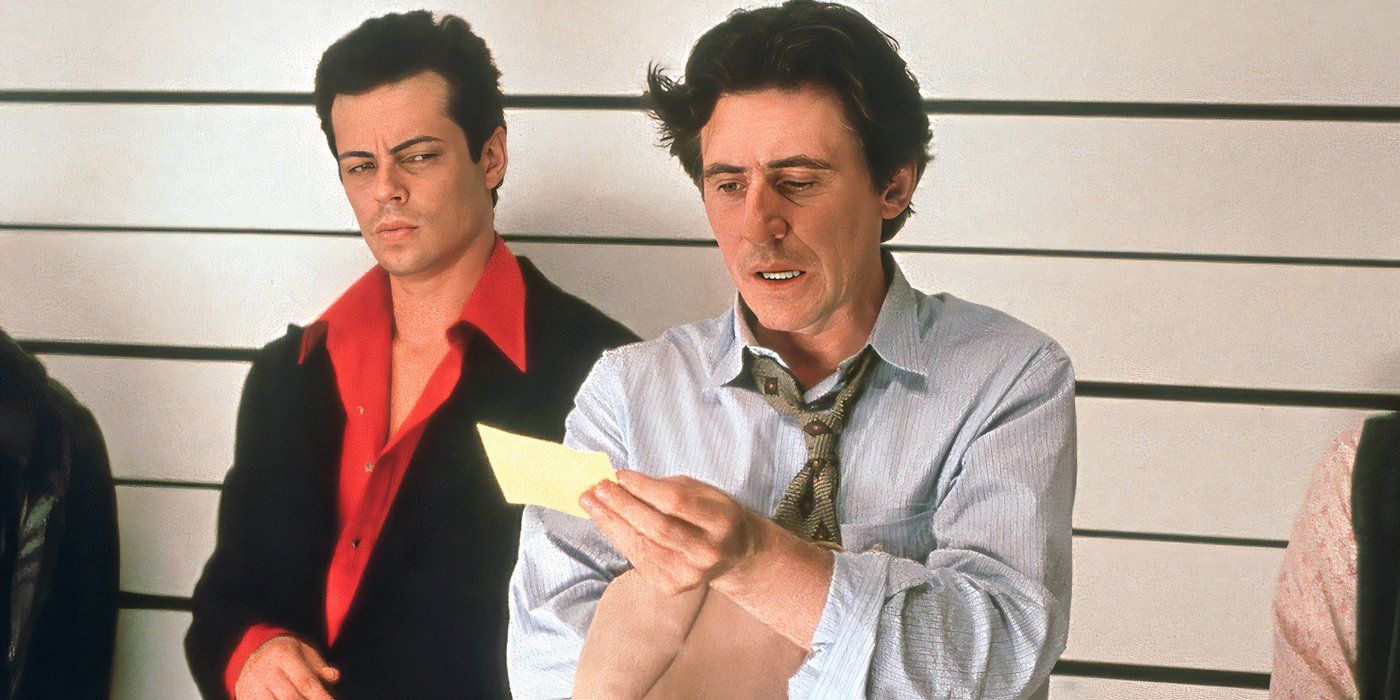
Image by Nimesh Niyomal Perera

For those who have noticed the best mystery films are often like a magician’s trick where you know the secret but can’t resist reaching for it a second time, you’re not alone. There’s something irresistible about a movie that pulls you in and dares you to outsmart it, only to leave you grinning thanks to how cleverly you have been duped. Whether it’s a jaw-dropping twist or just the thrill of catching details you might have missed the first time, some mysteries are truly masters at pulling you in more than once, practically demanding a second (or third… or sixth) look. From Zodiac to Mulholland Drive, these are the most rewatchable mystery films that turn audiences into detectives, rewinding scenes, and uncovering new details with every watch.
10
‘Zodiac’ (2007)
Directed by David Fincher
Image via Paramount Pictures
Very few films make for quite the slow-burning, rewarding watch like David Fincher’s Zodiac. Based on the real-life hunt for the elusive Zodiac killer, this absorbing crime thriller plunges audiences into the paranoia and obsession that gripped San Francisco from the late 1960s through the early 1970s, following three men — a cartoonist (Jake Gyllenhaal), a journalist (Robert Downey Jr.), and a detective (Mark Ruffalo) — as their lives become consumed by the unresolved, mysterious case. With its chilling atmosphere and complex characters, Zodiac goes beyond the typical true-crime procedural, transforming the genre into a labyrinthine exploration of obsession. Whether it’s the cryptic ciphers or the fact the enduring mystery surrounding the killer’s identity even today, it’s a movie that naturally begs for rewatching, with each viewing revealing new clues hidden in plain sight.
Zodiac
Release Date
March 2, 2007
Runtime
157 minutes
Jake Gyllenhaal
Robert Graysmith
Anthony Edwards
William Armstrong
Robert Downey Jr.
Paul Avery
9
‘The Sixth Sense’ (1999)
Directed by M. Night Shyamalan
Image via Buena Vista Pictures
Far from just inviting a rewatch, M. Night Shyamalan’s movie pretty much demands it. This breakout thriller follows Dr. Malcolm Crowe, played by Bruce Willis, is a child psychologist seeking redemption after a former patient’s tragic end, as he tries to help Cole Sear (Haley Joel Osment), a troubled boy who claims he can see dead people. Celebrated for its meticulous foreshadowing (and a now-iconic line, “I see dead people”), The Sixth Sense is laced with double meaning, which makes audiences often reach for it a second time. What makes this thought-provoking watch particularly great is how it goes beyond just depicting Cole’s terror and the growing bond between the two leads — it invites audiences to piece together the clues the director planted. The result (and the unforgettable twists it includes) make it one of the most thrilling movies of its era.
8
‘Gone Girl’ (2014)
Directed by David Fincher
Image via 20th Century Studios
Featuring Rosamund Pike’s astounding performance at its center, Gone Girl, adapted from Gillian Flynn’s bestselling novel, begins as a seemingly straightforward whodunit: Ben Afleck’s Nick Dunne comes home on his fifth wedding anniversary to find his wife missing, quickly becoming the prime suspect as the media and authority circle like vultures. What makes this Fincher film so epic and endlessly rewatchable is the way it weaponizes perspective, with every viewing offering a new angle on the unreliable narrator and the toxic marriage. Anchored by a revelation of a performance — brilliant, terrifying, sometimes hilarious — it offers both a genuinely absorbing and entertaining time in front of the screen and a sharp commentary on sensationalism, gender roles, and troubled marriages. Paired with the iconic “Cool Girl” monologue, Gone Girl is not only gripping but also deliciously engaging.
Gone Girl
Release Date
October 1, 2014
Runtime
2h 29m
7
‘Se7en’ (1995)
Directed by David Fincher
Image via New Line Cinema
If you thought that Gone Girl and Zodiac were the only Fincher mysteries that warrant multiple viewings, think again. Se7en stars Morgan Freeman as a world-weary veteran on the brink of retirement and Brad Pitt as his rookie partner. The dark thriller follows their hunt for a serial killer whose gruesome crimes are inspired by the seven deadly sins, each crime scene chilling and symbolic, dragging both detectives and viewers deeper into a terrifying descent. In Se7en, each frame is filled with clues, atmosphere, and existential dread — the killer is always one step ahead, which is what makes it so addictive. On repeat viewing, audiences get a better grasp of the meticulous craftsmanship, including the subtle foreshadowing and evocative cinematography that perfectly highlights a constant sense of impending doom, and a haunting score. The film culminates in a now-iconic final climax that continues to haunt audiences and spark discussion, making it an unforgettable watch.
Se7en
Release Date
September 22, 1995
Runtime
127 minutes
6
‘Knives Out’ (2019)
Directed by Rian Johnson
Image via Lionsgate Films
The perfect modern mystery classic that draws inspiration from the works of Agatha Christie, Rian Johnson’s Knives Out is a gleeful celebration and reinvention of the whodunit genre that upends expectations at every twist and turn. At its heart is Detective Benoit Blanc, wonderfully brought to life by Daniel Craig, as he investigates the apparent suicide of wealthy family patriarch and novelist Harlan Thrombey (the late and talented Christopher Plummer). But the deeper he digs into the case, the more tangled the web of lies and family secrets becomes. Knives Out stands out because it upends the traditional whodunit formula — instead of offering your typical guessing game, it reveals the “who” and “how” shockingly early, transforming into a cat-and-mouse game centered on the true culprit and an unlikely heroine (Ana de Armas). Still, the undeniably fun Knives Out is just as delightful on a second viewing, as sharp-eyed audiences will most likely catch cleverly planted details they missed the first time. The film was nominated for an Academy Award for Best Original Screenplay and has since launched a sequel, Glass Onion.
Knives Out
Release Date
November 27, 2019
Runtime
130 minutes
5
‘Rear Window’ (1954)
Directed by Alfred Hitchcock
Image via Paramount Pictures
When it comes to mystery flicks, the visionary Alfred Hitchcock simply must be mentioned — and Rear Window is perhaps his most enduring puzzle box. Set almost entirely within the apartment of photojournalist L.B. “Jeff” Jeffries (James Stewart), the movie transforms a Greenwich Village courtyard into a living tapestry of secrets and potential crime. Alongside Stewart, Grace Kelly shines as Lisa Fermont, Jeff’s stylish and resourceful girlfriend, whose involvement becomes crucial to the plot. But what truly makes Rear Window endlessly rewatchable is Hitchcock’s use of perspective and suspense. The legendary director makes every glance, shadow, and half-heard conversation into a potential clue, drawing Jeff — and, as a result, the audience — into the attempt to piece them together. Moments like Jeff’s use of a telephoto lens or the biting climax highlight the filmmaker’s mastery of slow-burn tension. At its core, Hitchcock’s movie is a delicious treat for slow-burn enthusiasts, elevated by strong performances and an atmosphere that keeps viewers on edge.
Rear Window
Release Date
September 1, 1954
Runtime
112 minutes
James Stewart
L.B. ‘Jeff’ Jefferies
4
‘Shutter Island’ (2010)
Directed by Martin Scorsese
Image via Paramount Pictures
Martin Scorsese’s Shutter Island, adapted from Dennis Lehane’s acclaimed novel, never loses its grip, no matter how many times you return to it. The story begins with U.S. Marshal Teddy Daniels (Leonardo DiCaprio) and his partner Chuck Aule (Mark Ruffalo) arriving at Ashecliffe Hospital, an asylum on a remote island, to investigate the disappearance of a patient. However, things turn sinister when Teddy’s own past begins to bleed into the case. Shutter Island is fascinating precisely because it is the kind of film that morphs into a different one entirely upon repeat viewings. With every scene layered with subtle cues and psychological misdirection, drawing audiences deeper into Scorsese’s world, where paranoia and disorientation mirror Teddy’s mind. Couple it with its iconic, infamous twist, and it’s easy to see how Shutter Island invites multiple revisits.
3
‘The Usual Suspects’ (1995)
Directed by Bryan Singer
Image via Gramercy Pictures
Bryan Singer’s The Usual Suspects is a great example of a perfectly unreliable narrator. The film opens with a boat exploding in the harbor, leaving only two survivors and a web of questions. Then, it follows a meek con artist with a limp and a talent for spinning tales, played by Kevin Spacey, who is grilled by Agent Kujan (Chazz Palminteri) about what really happened that night. The ensemble also includes Gabriel Byrne, Benicio Del Toro, Stephen Baldwin, and Kevin Pollak. With nearly the entire film unfolding through Verbal’s flashbacks, The Usual Suspects delivers a narrative that sweeps audiences and investigators along as it tells a story that is both convincing and detailed. With razor-sharp dialogue, moody cinematography, and truly intricate plotting, it is the kind of film that will have audiences piecing together clues hidden in plain sight on repeated viewings. Its legendary twist ending has become one of cinema’s most discussed reveals.
2
‘Memento’ (2000)
Directed by Christopher Nolan
Image via Newmarket Films
Christopher Nolan has had his own fair share of mind-bending mysteries and genre-defining thrillers. Yet, even among his many acclaimed works, Memento — based on a short story by Jonathan Nolan — stands out as the ultimate rewatchable mystery by daring viewers to piece together its fractured narrative one scene at a time. The story centers around Guy Pearce’s Leonard Shelby, a former insurance investigator suffering from anterograde amnesia. Leonard attempts to track down the man who murdered his wife, using just a patchwork of Polaroids, scribbled notes, and tattoos. Memento tells the story in two timelines: one moving forward, the other moving backward, both converging at the film’s devastating climax. What makes it worth revisiting is precisely this structure, which invites audiences to reexamine every scene for hidden meanings and subtle revelations that only become clear once you know the full picture. Nominated for two Academy Awards and regarded as a modern classic, this meditation on identity and the fragile nature of truth is a must-see for every cinephile, delving into how our perception of reality is shaped by what we remember — or forget.
Memento
Release Date
May 25, 2001
Runtime
113 minutes
1
‘Mulholland Drive’ (2001)
Directed by David Fincher
Image via Universal Studios
In David Lynch’s iconic Mulholland Drive, a woman (Laura Harring) stumbles out of a car crash with no memory of who she is. As she crosses paths with Betty (Naomi Watts), an aspiring actress new to Hollywood, the two embark on a search for answers. However, what starts as a detective story turns into a surreal, nightmarish odyssey through the city of dreams. Lynch — who will forever remain a legend of cinema — has always been a master of the surreal and mysterious, but even among his most enigmatic films, the genre-bending Mulholland Drive takes center stage through the way it perfectly blurs the lines between fantasy and reality, hope and heartbreak. With the aid of a brilliant, famously non-linear narrative, Mulholland Drive becomes rewatchable because it refuses to explain itself. Each viewing reveals new layers, whether those are visual motifs or cryptic dialogue. For those who love true cinematic riddles, Lynch’s movie is a mesmerizing viewing that only grows stranger and richer with every watch.
NEXT: 10 Must-Watch Mystery Movies, Ranked








